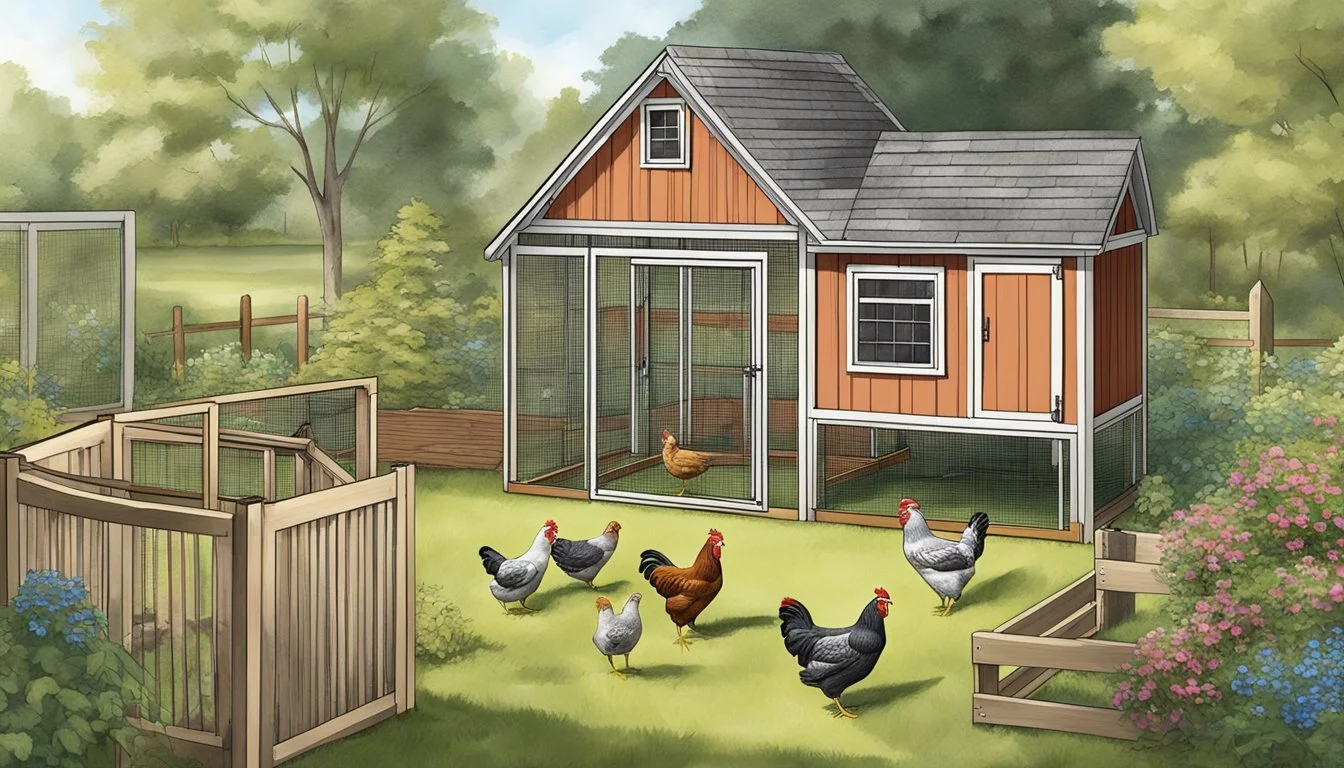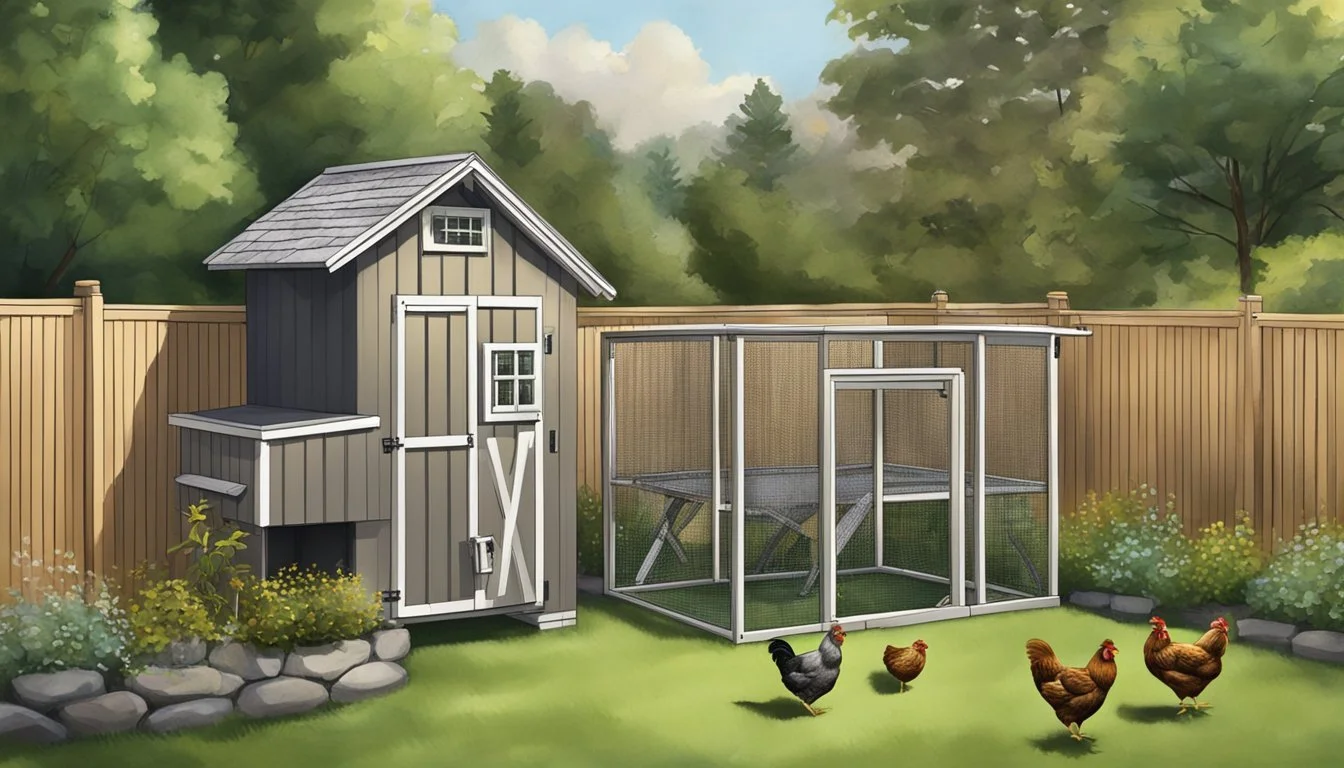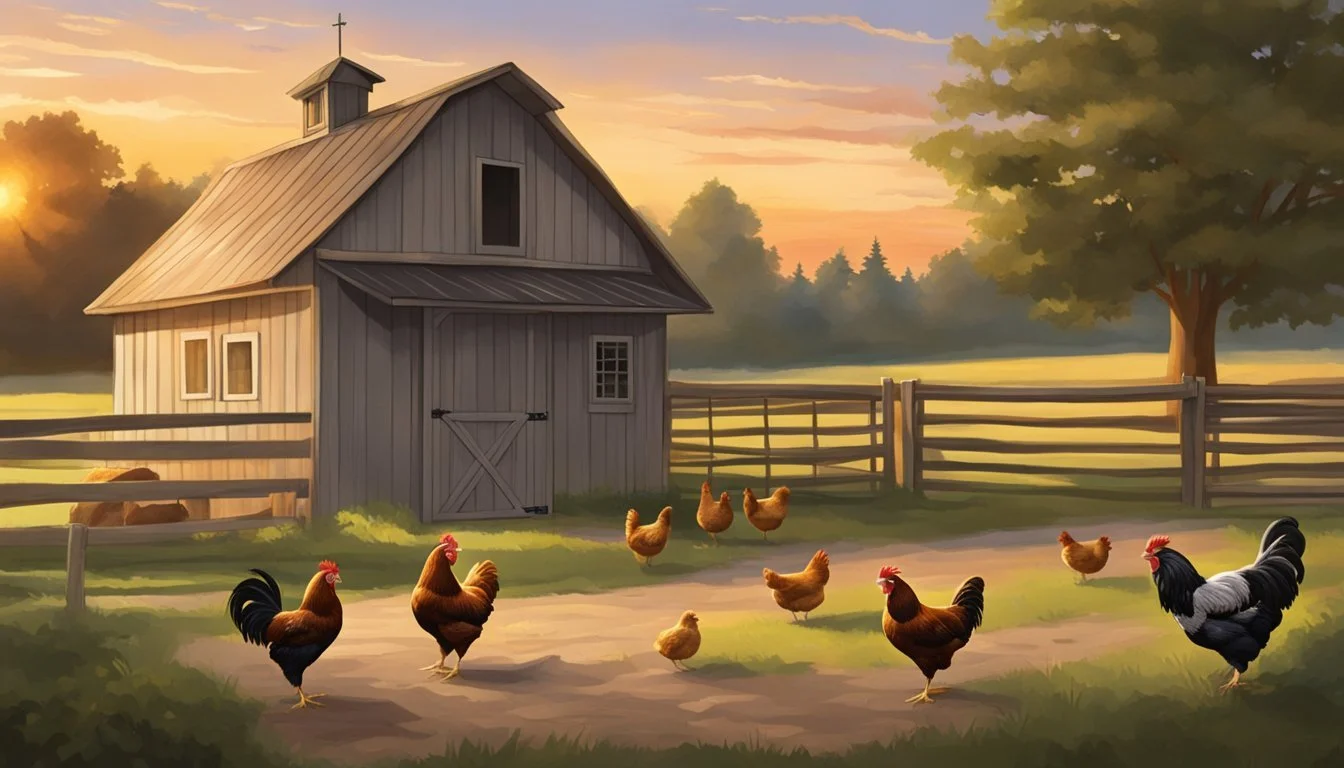Raising Backyard Chickens in Wausau, WI
A Beginner’s Guide to Urban Poultry Farming
Raising backyard chickens has become an increasingly popular practice among residents of Wausau, Wisconsin. This trend is part of a broader movement towards urban agriculture and sustainability, where individuals seek a closer connection to their food sources. In Wausau, the city regulations have been adapted to allow for the keeping of chickens within certain guidelines, demonstrating a recognition of the benefits that this activity can bring to local communities. Prospective poultry keepers must adhere to specific rules, such as distance requirements for coops from residential boundaries and water sources.
The city's approach to urban farming reflects a balance between the interests of chicken enthusiasts and the overall community welfare. Following a debated proposal, Wausau city leaders voted to permit backyard chicken farming. Wisconsin's statewide approach to backyard poultry is evolving too, with legislation being considered that might standardize the rules across all communities. Such regulations are essential to ensure the health and safety of both the animals and the residents, as well as to preserve the peace and aesthetics of neighborhoods.
As a result, individuals interested in raising chickens in their backyards in Wausau must be informed of the current laws and proposed changes that could impact how they engage in this activity. They are responsible for obtaining any necessary permits and making suitable arrangements for the housing and care of the poultry, which includes ensuring their coops are at appropriate distances from neighboring properties and are well-maintained to prevent nuisances or health hazards.
Understanding Local Chicken Ordinances
Before raising backyard chickens in Wausau, WI, residents must be aware of the specific local ordinances that govern the keeping of poultry within the city limits. These regulations ensure the welfare of the animals, as well as address concerns of the community.
Wausau Specific Regulations
In Wausau, WI, the local chicken ordinances are quite specific to ensure the health and safety of both the chickens and the community. The city ordinance states that coops or housing structures for chickens:
Must be kept 300 feet from any residential boundary line.
Must be located at least 100 feet from any stream or lake.
These distance requirements are in place to minimize any potential nuisance or health risks associated with keeping chickens close to living spaces and natural water bodies.
Permit Requirements and Limitations
Contrary to some municipalities where a permit might be required, in the city of Wausau, there is no permit required to keep chickens. However, this does not mean that there are no limitations. The city's regulations have outlined the following stipulations:
The sale of baby rabbits, chicks, and other fowl is subject to city regulations.
Note that while the state of Wisconsin is looking into establishing broader laws that could allow for the keeping of up to four chickens on residential properties, it is imperative that residents of Wausau comply with local chicken laws until such state laws are enacted and come into effect. Regulations may encompass the keeping of different types of fowl, and local governments may still impose their own restrictions, such as prohibiting roosters or requiring neighbor notifications.
Selecting Appropriate Chicken Breeds
When choosing chicken breeds for a backyard flock in Wausau, Wisconsin, potential poultry keepers must consider purpose—whether for egg production, meat, or both—as well as the local climate.
For Egg Production
Chickens bred primarily for egg production are referred to as layers. In Wausau, breeds like the Australorp are recommended for their high egg yield, laying over 250 brown eggs per year. These hens are not only prolific layers but also have a docile temperament, making them suitable for backyard settings.
For Meat Production
For those interested in raising chickens for meat, selecting breeds that grow quickly and have a substantial body weight is essential. While specific meat breed recommendations are not provided in the search results, breeds such as Cornish Cross are commonly chosen for these purposes due to their rapid growth rate and ample breast meat.
Dual-purpose Breeds
Dual-purpose breeds offer the best of both worlds, providing both eggs and meat. The Plymouth Rock is an example of a heritage breed that is suitable for Wisconsin climates, known for its hardiness and steady egg production. These chickens can serve as a source of eggs and, later in life, meat.
Considerations for Local Climate
Wausau's climate includes cold winters, so chicken breeds must be able to withstand low temperatures. Selecting breeds with good feathering, such as the Australorp or Plymouth Rock, helps ensure chickens stay warm. Additionally, proper coop insulation and wind protection are necessary to keep chickens healthy during harsh winters.
Setting Up Your Chicken Coop
Setting up a chicken coop in Wausau, WI, involves adherence to specific regulations, ensuring chickens have a comfortable dwelling, and safeguarding against potential threats. It's crucial to select an appropriate location, incorporate essential coop features, maintain security, and keep the environment clean for the health and productivity of backyard chickens.
Choosing the Right Location
The coop must be positioned at least 300 feet from any residential boundary line and 100 feet from any stream or lake to comply with Wausau's regulations. One should look for a well-drained area that receives adequate sunlight and has natural shelter from wind. The location should also facilitate easy accessibility for feeding and cleaning while being discreet to avoid any neighborhood disputes.
Essential Coop Features
Each chicken requires 2-3 square feet of space inside the coop and 8-10 square feet for outdoor roaming. Key structural features include:
Nesting Boxes: One box per 4-5 hens, placed in a dark, quiet corner of the coop.
Chicken Feeders: Position feeders at the height of the chickens' backs to prevent spillage.
Ventilation: Proper airflow is critical to prevent moisture build-up and maintain air quality.
Insulation: Appropriate for Wausau's climate to keep chickens warm during harsh winters.
Security Against Predators and Pests
A sturdy coop construction is essential to protect against predators like foxes, raccoons, and hawks. All entry points, including doors and windows, must have secure latches. Using 1/2 inch hardware cloth for window screens and burying it around the perimeter of the outdoor area can help prevent diggers from getting in. Regular checks for vulnerabilities and prompt repairs are necessary for ongoing security.
Maintaining Cleanliness
Consistent cleaning routines reduce disease risk and discourage pests. Here's what's essential for coop maintenance:
Manure Management: Regular removal and composting of manure keep the coop hygienic.
Cleaning Schedule: Weekly cleaning of the coop and monthly deep cleans should be planned.
Material Selection: Non-porous materials in the coop's construction make cleaning more manageable.
This section underscores the careful considerations and steps needed to successfully set up a chicken coop, adhering to local ordinances, and ensuring the well-being of backyard chickens in Wausau, WI.
Chicken Care and Maintenance
Raising backyard chickens in Wausau, WI, necessitates careful planning and consistency to ensure the flock's health and productivity. This section provides specific guidance on feeding, watering, health management, disease prevention, and routine care.
Feeding and Watering
Proper nutrition is essential for the vitality of backyard chickens. Chicken feed should be balanced, containing all necessary nutrients. It typically includes grains, proteins, and supplements such as calcium for eggshell strength.
Chicken Feed Types:
Starter feed for chicks with higher protein content
Grower feed for developing pullets
Layer feed for egg-laying hens with increased calcium
Access to clean and fresh water is critical:
Automatic waterers help maintain a constant supply
Waterers should be cleaned regularly to prevent algae and contamination
Health and Well-being
Maintaining a chicken's health involves regular observation for any signs of distress or illness. A visit to the veterinarian may be necessary if a chicken displays unusual behavior or symptoms.
Look for signs such as:
Lethargy
Abnormal droppings
Respiratory issues
Egg health is also a direct indicator of a chicken's wellbeing:
Collect eggs daily
Ensure eggs are clean to reduce the risk of salmonella infection
Preventing Diseases
Preventative measures are key to avoiding health issues within the flock. Biosecurity practices include:
Keep the coop clean: Regular removal of soiled bedding and droppings
Quarantine new birds for 30 days before introducing them to the flock
Vaccinate where appropriate and follow local regulations
Salmonella precautions:
Wash hands thoroughly with soap after handling chickens or eggs
Avoid eating or smoking while in contact with the birds
Daily and Seasonal Care Routines
Morning: Release chickens from the coop and check for any overnight issues
Throughout the day: Monitor food and water supplies, and observe chicken behavior
Evening: Secure chickens in the coop to protect from predators and check that all hens have returned
Seasonal care adjustments:
Summer: Ensure adequate shade and ventilation to prevent overheating
Winter: Provide sufficient insulation and possibly heat lamps in extremely cold conditions
Managing a healthy flock requires attention to detail, continuity in care, and adherence to best practices for feeding, watering, and overall maintenance.
Legal and Social Considerations
In Wausau, WI, the keeping of backyard chickens involves navigating local regulations and addressing neighbor concerns to ensure harmony and public health. The City Council has enacted ordinances that permit the practice while balancing community interests.
Managing Neighbor Relations
Residents must inform their neighbors when they plan to keep chickens, as mandated by local law. The City of Wausau allows chickens in residential areas, however, it's essential to communicate with neighbors to prevent disputes. Maintaining open lines of communication can alleviate concerns regarding the presence of chickens on adjacent properties.
Dealing with Noise and Smell
The city has set a limit on the number of chickens allowed, ensuring that noise and smell are kept to a minimum. Chickens should be housed in a manner that limits any olfactory or auditory impact on adjoining homes. The City Council, including members like Lisa Rasmussen, can be contacted for additional information on coop restrictions and how to manage these aspects of chicken keeping to comply with city regulations.
Contact Name: Lisa Rasmussen
Last Updated: 2017 when City Council passed the ordinance
Public Health and Safety
Public health and safety are paramount. The city stipulates specific distances for coops from residences and water sources: coops must be placed at least 300 feet from any residential boundary and 100 feet from streams or lakes. This ensures the public’s safety by mitigating the risks of noise, odor, and possible health concerns linked to the proximity of chicken coops to living spaces and water bodies.
Beyond Chickens: Other Poultry
While chickens are a popular choice for backyard poultry enthusiasts, ducks and geese are also viable options. They are known for their ability to adapt to various environments and can bring unique benefits to their caretakers.
Raising Ducks
Ducks are known for being hardy and less susceptible to many of the diseases that can affect chickens. They can provide pest control by foraging for bugs and snails, which are part of their natural diet. Ducklings require a water source for healthy development, so potential keepers should plan for appropriate accommodations. Here's what one needs to consider:
Housing: Ducks need shelter from predators and harsh weather.
Food: They eat a variety of food, including commercial duck feed and foraged insects.
Water: Access to clean water for drinking and bathing is essential.
Raising Geese
Geese have a reputation for being excellent 'guard animals' due to their alertness. They can thrive on a diet that includes a significant amount of grass, making them efficient at keeping lawns trimmed. When raising geese, one should keep in mind the following:
Social Structure: Geese are sociable and should be kept in pairs or small flocks.
Space: They require more space than chickens due to their larger size.
Water: Like ducks, they need access to water for drinking and swimming.
In summary, ducks and geese represent enriching alternatives to raising chickens and can contribute both practical and enjoyable aspects to backyard poultry keeping.
Resources and Community Involvement
The section provides readers with guidance on integrating into the Wausau backyard chicken community and where to find necessary supplies. It emphasizes tapping into existing forums for more information, understanding local laws, and identifying retailers for supplies in Wausau and nearby cities such as Milwaukee and Madison.
Joining Local Chicken Forums
Individuals interested in raising backyard chickens in Wausau have the opportunity to join local chicken forums. These forums are hubs for exchanging information, learning about local regulations, and connecting with experienced chicken keepers. For beginners, forums can be invaluable for gleaning knowledge on the intricacies of raising chickens in compliance with city ordinances. Manitowoc and other towns also have forums where Wausau residents can broaden their network. A great starting point includes online platforms such as:
Wausau Backyard Chickens – A community-driven forum focused on the Wausau area.
Wisconsin Poultry Enthusiasts – A broader group that includes members from cities like Milwaukee, Madison, Green Bay, and Kenosha.
Finding Supplies and Retailers
For those raising chickens, finding the right supplies is critical. Wausau and its neighboring cities have a range of retailers that cater to backyard poultry needs. From coops to feed, these retailers often provide guidance to beginners on selecting the right products. Here are several local options:
Retailer Location Supplies Offered Farm & Fleet Wausau Coops, feed, health products Rural King Green Bay Poultry equipment, feed True Value Kenosha Bedding, feeders, waterers
It is recommended to check with each retailer for specific inventory. Additionally, many retailers offer links to online resources for more comprehensive support.
Conclusion
In Wausau, the adoption of an ordinance has allowed residents to embrace the practice of raising backyard chickens responsibly. Homeowners have shown that, with proper guidelines, they can maintain small flocks without disrupting community life. Wausau's limit of 4 chickens ensures manageability and minimal impact on neighbors.
With only hens allowed to curb noise issues, families enjoy fresh eggs while learning about animal care. Permits and property inspections add a layer of oversight, reflecting a commitment to public health and safety.
Backyard chickens are more than just a trend; they represent a movement towards sustainability and local food production. In areas like Wausau, nestled among streams and lakes in Marathon County, these practices align with the region's natural lifestyle.
The success of Wausau's urban chicken farming could serve as a model for other communities, demonstrating that with sensible regulations, raising chickens can be a practical component of suburban and urban living.
Raising chickens requires dedication, but residents find it a fulfilling endeavor aligning with a sustainable lifestyle. Those interested in the well-being of their flocks and community will find Wausau accommodating to their aspirations for a closer connection with their food sources.










